Fostering Excellence
The University Honors Program exists to promote the excellence proclaimed in the university motto, Access & Excellence. It is a small program—some 125 members—with a large mission. Just as with MSUB itself, its focus is on students, on creating opportunities for them and nurturing their talents. Unlike some honors programs, its orientation is not elitist. Honors classes are open to students across the university. Its largest undertaking each year, serving as lead sponsor and principal organizer for the Research, Creativity, and Community Involvement Conference, showcases and celebrates student accomplishment from across the university, including by graduate students. What follows might be called the highlight film of the UHP’s year.
Three Profiles of Accomplishment
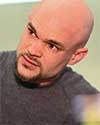 Cody Walters became the university’s second winner of the prestigious Goldwater Scholarship,
awards for the most talented STEM students in America who intend to pursue a research
career. Cody’s story is one of unexpected transformations, opening horizons, and remarkable
determination. His father’s hemorrhagic stroke provides its fulcrum, transforming
Cody from party-going construction worker, who had flunked out of college, into his
father’s caretaker, who realized that he needed to return to college in order to take
control of his own life and to gain knowledge to help his father. Each step in his
MSUB journey—his psychology major, the addition of a biology major and a chemistry
minor, and, most crucially, being invited to join Dr. Lynn George’s neuroscience research
group—nurtured his desire for greater understanding. While doing research, his quest
for knowledge that would help him better to respond to his father’s condition transformed
into a thirst for discovery. In the research lab, his goal became to conduct research
that helps find treatments for neurological diseases such as familial dysautonomia,
ALS, and Alzheimer’s.
Cody Walters became the university’s second winner of the prestigious Goldwater Scholarship,
awards for the most talented STEM students in America who intend to pursue a research
career. Cody’s story is one of unexpected transformations, opening horizons, and remarkable
determination. His father’s hemorrhagic stroke provides its fulcrum, transforming
Cody from party-going construction worker, who had flunked out of college, into his
father’s caretaker, who realized that he needed to return to college in order to take
control of his own life and to gain knowledge to help his father. Each step in his
MSUB journey—his psychology major, the addition of a biology major and a chemistry
minor, and, most crucially, being invited to join Dr. Lynn George’s neuroscience research
group—nurtured his desire for greater understanding. While doing research, his quest
for knowledge that would help him better to respond to his father’s condition transformed
into a thirst for discovery. In the research lab, his goal became to conduct research
that helps find treatments for neurological diseases such as familial dysautonomia,
ALS, and Alzheimer’s.
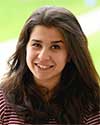 Miglena (Megi) Ivanova, this year’s Golden Merit Award recipient, has quite a different,
but equally compelling story of challenge and high accomplishment. Rather like Dorothy
yearning for a somewhere over the rainbow, Megi left Bulgaria in order to come to
Montana, first as a housekeeping worker in Yellowstone Park, later as an MSUB student.
As student, Megi immersed herself in university life, continually taking on more challenges,
adding a psychology major to her major in Psychiatric Rehabilitation, becoming an
ASMSUB senator and a supplemental instructor for the Academic Support Center, all
the while maintaining a 4.0 GPA. As she sought to understand substance abuse treatment
from a clinical and a scientific perspective, Megi became interested in research and
this spring presented some of her results at the Western Regional Honors Conference
and the Western Psychological Association Conference. In accepting the Golden Merit
Award and talking about her goal of earning her doctorate, Megi said, “I would like
to advise everyone to find ways to challenge themselves. This is the only way we can
continue to grow – by pushing our limits and trying to do what we have not tried yet.
No one made a difference by staying in their comfort zone. So, step out of it!”
Miglena (Megi) Ivanova, this year’s Golden Merit Award recipient, has quite a different,
but equally compelling story of challenge and high accomplishment. Rather like Dorothy
yearning for a somewhere over the rainbow, Megi left Bulgaria in order to come to
Montana, first as a housekeeping worker in Yellowstone Park, later as an MSUB student.
As student, Megi immersed herself in university life, continually taking on more challenges,
adding a psychology major to her major in Psychiatric Rehabilitation, becoming an
ASMSUB senator and a supplemental instructor for the Academic Support Center, all
the while maintaining a 4.0 GPA. As she sought to understand substance abuse treatment
from a clinical and a scientific perspective, Megi became interested in research and
this spring presented some of her results at the Western Regional Honors Conference
and the Western Psychological Association Conference. In accepting the Golden Merit
Award and talking about her goal of earning her doctorate, Megi said, “I would like
to advise everyone to find ways to challenge themselves. This is the only way we can
continue to grow – by pushing our limits and trying to do what we have not tried yet.
No one made a difference by staying in their comfort zone. So, step out of it!”
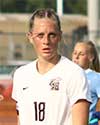 Amanda Hemmen combines excellence of a student with that of an athlete and team captain.
She earned first-team academic All-American honors and was an honorable mention all-league
for the second straight year. Praising her performance as soccer team captain, Coach
Stephen Cavallo commented “Amanda is constantly looking out for the best interests
of the program. The fact that she is able to juggle so many things and excel really
shows who Amanda is.” Amanda’s academic performance is equally noteworthy. She carries
a 4.0 as a Biology major and intends to attend medical school. The Biological and
Physical Sciences Department recommended that she apply for a Goldwater Scholarship,
but she decided not to apply since she wants a career as a physician, not as a researcher.
There is no doubt that Amanda will be as dedicated a doctor as she is a student athlete.
Amanda Hemmen combines excellence of a student with that of an athlete and team captain.
She earned first-team academic All-American honors and was an honorable mention all-league
for the second straight year. Praising her performance as soccer team captain, Coach
Stephen Cavallo commented “Amanda is constantly looking out for the best interests
of the program. The fact that she is able to juggle so many things and excel really
shows who Amanda is.” Amanda’s academic performance is equally noteworthy. She carries
a 4.0 as a Biology major and intends to attend medical school. The Biological and
Physical Sciences Department recommended that she apply for a Goldwater Scholarship,
but she decided not to apply since she wants a career as a physician, not as a researcher.
There is no doubt that Amanda will be as dedicated a doctor as she is a student athlete.
Boundary Spanning and Door Opening Classes
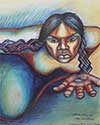 UHP classes are crucial to its goal of fostering high achievement. Each year, the
program invites proposals for courses that cross disciplines and break new ground
for students and professors alike. Professor Jennifer Lynn’s Global History in the
Graphic Novel and Professor Berru-Davis’s Art and Religion in Spain and the Americas
resulted from last year’s invitations. Using graphic novels and historical scholarship,
Professor Lynn and her students explored events including the Communist Revolution
in China, the Cuban Revolution, the Vietnam War, the Iranian Revolution, the Israeli-Palestinian
conflict, and the current refugee crisis. For their final project, the students conceived
their own graphic novels based upon a recent historical event of their own choosing.
As culmination to this fall’s course, Professor Berru-Davis will invite her students
to curate a show at a campus or local gallery, to do archival research, or to write
a grant proposal. In the UHP, learning is never passive; its classes are about doing
and creating.
UHP classes are crucial to its goal of fostering high achievement. Each year, the
program invites proposals for courses that cross disciplines and break new ground
for students and professors alike. Professor Jennifer Lynn’s Global History in the
Graphic Novel and Professor Berru-Davis’s Art and Religion in Spain and the Americas
resulted from last year’s invitations. Using graphic novels and historical scholarship,
Professor Lynn and her students explored events including the Communist Revolution
in China, the Cuban Revolution, the Vietnam War, the Iranian Revolution, the Israeli-Palestinian
conflict, and the current refugee crisis. For their final project, the students conceived
their own graphic novels based upon a recent historical event of their own choosing.
As culmination to this fall’s course, Professor Berru-Davis will invite her students
to curate a show at a campus or local gallery, to do archival research, or to write
a grant proposal. In the UHP, learning is never passive; its classes are about doing
and creating.
Showcasing Creative and Scholarly Achievement
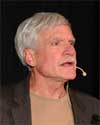 From across the university, one hundred thirty-two students presented their work as
part of the Sixth Annual Research, Creativity, and Community Involvement Conference.
As part of the conference, there was a jazz band concert, juried art show, poetry
reading, research poster session, oral presentations, and a discussion forum on a
proposal for a university environmental policy. Noted nature and ecology author, Gary
Ferguson gave the keynote address, “Lessons from the Wild: Nature and Creativity,”
including in it excerpts from his forthcoming book The Eight Master Lessons of Nature.
From across the university, one hundred thirty-two students presented their work as
part of the Sixth Annual Research, Creativity, and Community Involvement Conference.
As part of the conference, there was a jazz band concert, juried art show, poetry
reading, research poster session, oral presentations, and a discussion forum on a
proposal for a university environmental policy. Noted nature and ecology author, Gary
Ferguson gave the keynote address, “Lessons from the Wild: Nature and Creativity,”
including in it excerpts from his forthcoming book The Eight Master Lessons of Nature.
. . . . .
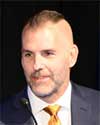 As commencement approached, the University Honors Program invited its graduates to
reflect upon their MSUB and Honors journeys. In doing so, Scott Gorman, the 2019 Outstanding
Graduate in the College of Business, wrote, “The Honors Program allowed me to hit
pause from time to time, to look around, to understand my surroundings—how they affect
the world in which I live—then to decide again about my direction. It helped me to
find myself within me.” As Aristotle noted long ago and Scott affirms, excellence
is not a state, but a process.
As commencement approached, the University Honors Program invited its graduates to
reflect upon their MSUB and Honors journeys. In doing so, Scott Gorman, the 2019 Outstanding
Graduate in the College of Business, wrote, “The Honors Program allowed me to hit
pause from time to time, to look around, to understand my surroundings—how they affect
the world in which I live—then to decide again about my direction. It helped me to
find myself within me.” As Aristotle noted long ago and Scott affirms, excellence
is not a state, but a process.

